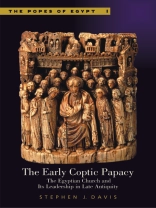The Copts, adherents of the Egyptian Orthodox Church, today represent the largest Christian community in the Middle East, and their presiding bishops have been accorded the title of pope since the third century AD. This study analyzes the development of the Egyptian papacy from its origins to the rise of Islam. How did the papal office in Egypt evolve as a social and religious institution during the first six and a half centuries AD? How do the developments in the Alexandrian patriarchate reflect larger developments in the Egyptian church as a whole—in its structures of authority and lines of communication, as well as in its social and religious practices? In addressing such questions, Stephen J. Davis examines a wide range of evidence—letters, sermons, theological treatises, and church histories, as well as art, artifacts, and archaeological remains—to discover what the patriarchs did as leaders, how their leadership was represented in public discourses, and how those representations definitively shaped Egyptian Christian identity in late antiquity. The Early Coptic Papacy is Volume 1 of The Popes of Egypt: A History of the Coptic Church and Its Patriarchs. Also available: Volume 2, The Coptic Papacy in Islamic Egypt, 641–1517 (Mark N. Swanson) and Volume 3, The Emergence of the Modern Coptic Papacy (Magdi Girgis, Nelly van Doorn-Harder).
عن المؤلف
Stephen J. Davis is professor of religious studies, history, and Near Eastern languages and civilizations at Yale University, specializing in late ancient and medieval Christianity. He is the author of several books, including Coptic Christology in Practice and Christ Child: Cultural Memories of a Young Jesus, and executive director of the Yale Monastic Archaeology Project (YMAP), which has sponsored archaeological and archival work at several monastic sites in both Lower and Upper Egypt.












